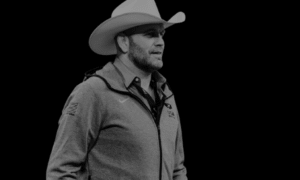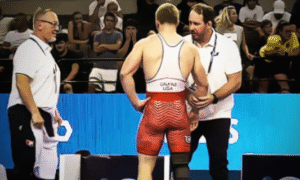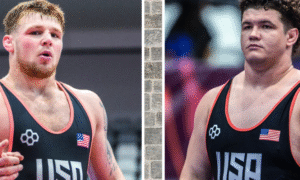If there is one item that United World Wrestling is trying to drill into everyone’s head thus far in 2018, it is that “negative wrestling” should be avoided at all costs.
The year is barely a quarter of the way through and UWW has already seen fit to enact sweeping changes to its latest rule-set. These amendments, which are explained in detail by UWW/USAW official Zach Errett and will go into effect beginning next month, include several wrinkles which are designed to deliver swift punishment to Greco-Roman athletes who intend to bog down the action on the mat. In other words, passivity is no longer the primary method of in-match “stimulation” the officials will use. Passivity is still there (although that too has been changed), but it is the aforementioned negative wrestling that will become the focal point.
Perhaps the first Greco-Roman rule update based on negative wrestling that is sure to create a stir involves cautions. Entering the year, the dreaded caution-and-two was cut in half and the less-aesthetically-sounding caution-and-one became the principle penalty for egregious infractions (such as leg fouls), but that has since been wiped away. Caution-and-two’s will once again be the call for nearly all negative wrestling situations with one exception (outlined below). It is also important to note that cautions due to fleeing the mat, fleeing the hold, defensive leg fouls, and hands to the face will be distributed without a warning.
The rule updates for Greco-Roman will be applied to all age groups.
Negative Wrestling: Cautions
Caution +2 without Attention (warning)
- Fleeing the mat (standing) — restart standing
- Fleeing the mat (par terre) — restart in par terre
- Fleeing the mat (danger) — restart in par terre
- Hands to the face
- Defensive leg fouls — restart in the same position foul occurred (second call is an automatic disqualification)
Also, if offensive points are scored in spite of a defensive leg foul, those points will be added along with the caution, as how it was before.
Caution +2 with Attention (warning)
- Interlocking fingers (finger grabbing)
- Offensive pushing (e.g., pushing to make opponent step out)
- All instances of “avoiding open wrestling” (head down, blocking with both hands, unsportsmanlike conduct)
Wrestlers penalized for “brutality” will receive an immediate red card, resulting in removal from the competition.
Caution +1 with Attention (warning)
- Offensive leg fouls — restart standing
Changes to Passivity
The most popular Greco-Roman rule update for 2018 involved passivity (and subsequently, par terre). Passive calls couldn’t be made before two minutes had gone by in the first period leading to the first par terre, and not until four and a half minutes (90 seconds left in the match). These timestamps will be a thing of the past come April 2nd. As Errett sums up in the video, “There is no longer a time requirement that must be met before passivity can be called.”
What does stay the same is the number of par terre chances — two maximum per bout (one for each period). When par terre has been exhausted, wrestlers dinged for passive will give up a point.
Quelling Concerns
UWW attempted to make it known both last year and three months ago that negative wrestling was an area they wanted to address. At the time, “hooking” (underhooks/overhooks used for scoring actions) served as the premier example of what to do, with overzealous hand-fighting and bailing out being presented as what not to do. Clearly, a disconnect still remained between athletes and referees when the new rules rolled out in January, hence the need to more aggressively eliminate perceived negative wrestling by dishing out harsher punishments. The thing is, though the rule amendments may seem concentrated on deterring would-be offenders, they are actually put in place to incite offensive risk (while also more directly spelling out to athletes what will be expected of them).
“For negative wrestling, I actually think trying to enforce some of these areas more will lead to more scoring,” Errett said on Friday. “There is a match on the video that is around the 45-minute mark and it is a really good example. The red wrestler (Mark Madsen) is clearly blocking with two hands on his opponent’s (Alex Kessidis) chest and is preventing him from even being able to take a lock. The blue wrestler (Kessidis) gets called for passivity. In reality, (it is) the Red wrestler who is preventing scoring. I think these are the areas that UWW wants to change, these items are what prevent scoring. If wrestlers were out there scoring as many points as freestyle, there probably wouldn’t be a need to make this a point of emphasis. The reality is that many wrestlers have won matches and Olympic medals, and haven’t scored a technical point other than through passivity.”
One change that shouldn’t bring up too much debate is defensive leg fouls going back to a two-point caution. Competitors on the precipice of getting scored on would much rather give up a single point rather than two, four, or five, and fans of the sport have seen these types of situations play out already in numerous events this year. Returning defensive leg fouls to a caution-and-two was going to wind up becoming a hot topic following this season if this trend continued, so the adjustment will likely be embraced. “I believe that changes were driven by some of the things that had come up at the early events,” Errett explained. “If a leg foul was only a caution +1, who wouldn’t commit one to not get thrown for five points?”
The announcement of these rule updates via Errett’s latest video is only two days old, so news hasn’t filtered out all the way across the country just yet. Of course when it does, the whole Officials have too much power! battlecry is likely to be heard. It’s a fact of life Errett understands well, a familiar refrain that comes with the territory. But he is committed to increasing the lines of communication so that athletes and coaches trust that the officials have the sport’s best interests at heart.
“If someone can come up with rules that take the referees out of the match, I would be for it,” declares Errett. “The reality is, there is an element of judgement that is going to enter into it all the time. Whether it is determining passivity, negative wrestling, double legs/bodylocks, etc. — there will always be something that the referee will have to make a decision on. In Fargo last year, I showed a clip of a double leg/bodylock situation going out of bounds to coaches. It wasn’t any of their kids, so they were just viewing it from an unbiased perspective. In the room, I received three possible scoring options. As referees, we certainly do the best that we can. We are trying to remove the people who are biased so that the wrestlers decide the match. That is our goal. It takes time to remove the stigma of the past.”
Athlete Take
Multi-time World Team member and 2016 Olympian Robby Smith (130 kg, NYAC) is no stranger to flighty calls. Just last month at Denmark’s 2018 Thor Masters Invitational (the same event where Kessidis lost to Madsen, as mentioned above), Smith endured a frustrating 2-0 loss to 2017 U23 World bronze medalist Jello Krahmer (GER) that resulted in its fair share of unfavorable feedback. Krahmer did not make any discernible attempts throughout the contest, yet received both passivity points/par terre chances, his offensive measures reduced to holding Smith’s wrists and plodding around the mat.
But situations like the one with Krahmer have followed Smith around for most of his career, specifically at heavyweight. He was famously put down in Rio against eventual bronze medalist Sabah Shariati (AZE) in the second period despite putting forth a more offensive posture and holding a 2-0 lead that was earned on an arm throw. So this is all nothing new to the 31-year-old. But even with that, Smith is optimistic that the changes coming down the pike in April will not only benefit the sport, but also his own technical approach.
“In theory — in theory — these rules sound great,” Smith offers. “They sound like they are going to help me and they sound like they are going to help the USA, especially given how we’ve been training this year. Me personally, I want to wrestle. I want a guy to wrestle me and not just hold my wrists, sit there, stall out, and that’s how I lose matches.”
One of the more common positions that Smith puts up with in matches against passive types is a collar-tie, which if held onto by opponents under the updated rules could be construed as negative wrestling. If emphasized by the officials, opponents will be penalized and Smith should have more scoring chances.
“A lot of the tall guys like to hold collar-ties and keep me away because they know if they can create distance they’ll be better-off due to my attacks,” Smith says. “In that way, these rules are great. But that’s in theory. If these referees actually abide by their own rules, it’ll be terrific.”
Going by his usage of “in theory”, it’s obvious that Smith still holds some reservations about how the refreshed rules involving passivity and negative wrestling will be called, a product of having been on the wrong side of questionable calls throughout his career. Not that Smith is teeming with bitterness, but he is skeptical. He also doesn’t like that passive points will be doled out the same way they were during the 2016-17 campaign.
“They’re saying you can only go down (in par terre) twice, but it also says that you can get called for passive on your feet without stopping the match as many times as the ref wants to do it,” observes Smith. “This is garbage in my mind, unless they call it right. Then it’s going to be great. But if they don’t, it’s going to be horrible for the sport again.
“But if the rules are applied correctly and nothing controversial happens, they can be great. They can be amazing and help us bring back Greco-Roman wrestling. They want to see underhooks, they want to see two-on-one’s, action, guys going for the big throw. And that is what Greco-Roman is about, choking people out and throwing them on their heads. But I am scared that the rules won’t be interpreted the way they are being explained”
We won’t have to wait too long to find out. But like Smith says, if the execution of the rules is congruent to Errett’s video, it could be the spark Greco has been waiting for.
https://youtu.be/y8lcmgDEu0ISUBSCRIBE TO THE FIVE POINT MOVE PODCAST
iTunes | Stitcher | Spreaker | Google Play Music | RSS


















